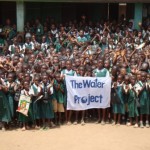This project was implemented by another partner, but is now monitored and maintained by The Water Project together with Mariatu's Hope.
A Sierra Leone team member shared, "The communities represented in the student community were very supportive. They were very active in the hygiene training. We were so surprised when people kept coming every day for the training which lasted for one week. Every community committed to building native toilets for those without toilets. There was a well technician in the community so we had him come around and work with our team at the other well rehabs that were done in the surrounding villages so he could gain experience on how to work on this type of hand pump."
"People came out each day to work on the sanitation project and offer assistance where they could. It was very encouraging. We will work with the community through the child health club to form a WATSAN committee for this school. Comments from team members: There was a high level of discipline in both the school and the community. This was the first community we have seen such an amount of disciple. The community is totally involved in the day to day running of the project, and assisted the team by providing any materials they had, food and security over the water project during the night. The Chief even went to the site every day to see the work that has been completed on the building and on the well. This was also the same for some other community members." The community established a water committee who is responsible for collecting a well maintenance fee of100 leones per five (5) gallons of water.
Most community members earn a living by farming petty trading, palm wine harvesting or by teaching at the local primary school. When the team arrived, community members were utilizing a river located one kilometer away from the community to meet all of their water needs. Because of this, families were suffering from dysentery, typhoid and malaria. Before leaving the community, the team provided Chief Pa Alimamy Turay, with a contact number in case their well were to fall into disrepair, become subject to vandalism or theft.
The Sierra Leone team had an opportunity to meet with fourteen year old community member and students, Baj Bangura, who stated, "The old toilets had structural damage and weren't so safe. We used open defecation in the bush. It was not hygienic to the school community. The new toilets are modern. They have many rooms and even have a hand washing station while the old latrines lacked such facilities."
During the hygiene education, the Sierra Leone team addresses: Hand washing, how to properly transport and store water, disease transmission, how to take proper care of the pump and how to keep the water clean, Oral Rehydration Solution (ORS), Latrine perception, good and bad hygiene behavior and the three legged stool. It is hoped that after hygiene education unhealthy practices in the community will subside – essentially allowing for a healthier community with access to clean, safe drinking water.
At the community meeting, we began the meeting with prayer. After the meeting, we all gathered at the site where the project would be constructed to pray over the land and then had a ground breaking ceremony. It was incredible. There were more than 500 people who attended the meeting. Each day the team would pray with the students, teachers and community members. There was bible storying at the hygiene training, so the teachers could do this with the students.
They were taught about the good news bracelets and were left materials to make these with the students. Everyone was very cooperative. The Section Chief is to be commended for his pulling all the communities together and for his commitment to allowing the Gospel to be shared in the school and communities. There is a real openness between peoples of different religions. Before leaving the community, the team distributed 500 Bibles to community families and shared oral Bible stories.
 WAsH for Schools
WAsH for Schools Rehabilitation Project
Rehabilitation Project












